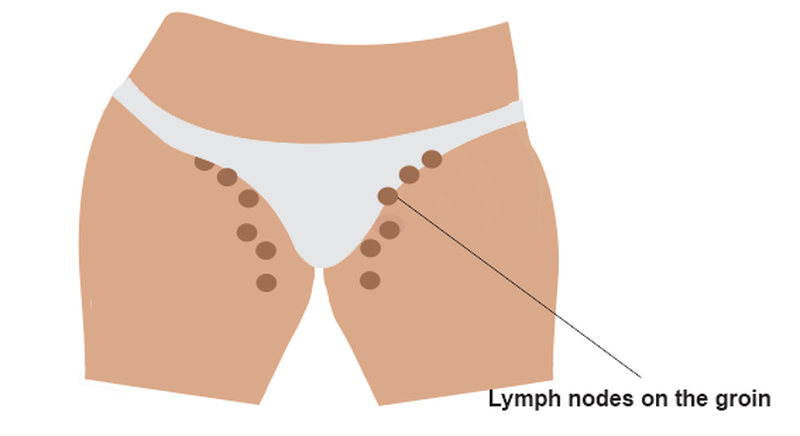Lymph nodes are small bean-shaped nodules of tissue which play a vital role in body’s defense against disease. They are located in various regions of the body and help in filtering out pathogenic micro-organisms such as bacteria, viruses, and other foreign antigens.
The lymph glands located in the crease between the inner thigh and pelvis region (groin area) are termed as inguinal lymph nodes. Under normal physiological conditions, these glands are not visible or tender on palpation. However, they swell and become inflamed in response to any pathology or disease in and around the areas.

What Causes Swollen Lymph Nodes in Groin?
Local or systemic infections
Certain bacteria causing skin or wound infections (cellulitis) in and around the groin region
Sexually transmitted infections i.e. syphilis, gonorrhea, chancroid (soft chancre), herpes simplex, lymphogranuloma venereum (LGV) and chlamydia
Infectious mononucleosis caused by Ebstein Barr virus (EBV) that may provoke generalized enlargement of lymph nodes in neck, armpits and groin region
Human immunodeficiency virus (HIV) that causes acquired immunodeficiency syndrome (AIDS) in an affected individual
A parasitic infection called Toxoplasmosis that occurs due to direct contact with fecal material of an infected cat or eating undercooked meat
Bubonic plague which is transmitted through a bite of the infected flea which induces colonization of bacteria Yersinia pestis. This infection results in pain and enlargement of lymph nodes in the groin region
Leishmaniasis, a protozoal infection that primarily affects the skin and mucous membranes and is transmitted via the bite of an infected female sandfly. This involves lymph nodes located in armpits and groin area
Trauma or injury to the groin area
You may suffer a trauma or injury to the legs, feet and groin region while playing sports. As a consequence, your lymph nodes enlarge and swell.
Immune system disorders
Certain immunological disorders such as rheumatoid arthritis, sarcoidosis or systemic lupus erythematosus (SLE) may develop generalized lymphadenopathy
Testicular torsion
Twisting of the spermatic cord which holds the testes may result in obstruction of blood circulation resulting in pain, testicular enlargement and swelling of inguinal lymph nodes
Malignant tumors
Hard, fixed and rubbery lymph nodes that enlarge rapidly are usually indicative of malignancy. The various types of malignant tumors may include:
Leukemia: It iscancer of the bone marrow and lymphatic system
Lymphoma: It is the cancer that starts within the lymphatic system. There are two kinds of lymphomas i.e. Hodgkin’s disease and Non-Hodgkin’s disease
Other cancers: The malignant tumor originating from anus, vulva or testes may also result in swollen lymph nodes in groin area
Melanoma of the skin: Stage II Melanoma can spread to the nearby lymph nodes causing their swelling and enlargement
Medications and vaccines
Medications: Although rare but certain drugs may cause generalized inflammation of the lymph nodes as a side effect or an allergy. These include antiepileptics e.g. phenytoin or carbamazepine, antibacterial drugs like penicillin, antimalarials such as pyrimethamine and medications used to treat gout e.g. allopurinol
Vaccinations: Lymph nodes may also swell in response to vaccinations such as MMR (measles, mumps, and rubella) and typhoid vaccine
Hydrocele testis
There is an accumulation of serous fluid around testicles that manifest as pain, tenderness, and swelling of the groin lymph nodes
What to Do If You Have Swollen Lymph Nodes in Groin Area?
Symptomatic treatment and home remedies
The pain and discomfort associated with swollen lymph nodes can be relieved by:
A warm compress: Take a clean washcloth and soak it in warm water. Remove the extra water and apply the cloth to the affected area for a period of or 5-10 minutes.
Massaging the lymph nodes:This will help in the removal of toxins and impurities accumulated in lymph nodes and subsequently, reduce the swelling.
Over-the-counter painkillers: You can take painkillers such as aspirin, ibuprofen, naproxen or acetaminophen for relieving pain and inflammation. However, aspirin may cause serious problems in children and teenagers who have recently gained recovery from chicken pox or flu-like symptoms.
Apple cider vinegar: Mix water and apple cider vinegar in equal proportions. Soak a clean washcloth in the mixture and apply it to the affected area for 5 minutes. Later, rinse with warm water. It subsides swelling by neutralizing the acidic environment necessary for colonization of pathogens and creates healthy pH level.
Castor oil: Applying and massaging the affected lymph nodes with castor oil helps to reduce swelling by its antiseptic and anti-inflammatory action.
Get enough sleep: For speedy recovery of the underlying disease, you need to take adequate rest and sleep.
Consult your physician for proper treatment of the cause
Completely relying on the home remedies or symptomatic treatment for swollen lymph nodes in groin is not wise. Always consult your physician if you notice any painful or painless enlargement of groin lymph nodes without any specific reason or when the swelling persists for more than two weeks. If you also experience symptoms such as sweating, fever, sudden loss of weight, tenderness, and discomfort then immediately seek medical help. Your doctor will do a thorough examination to diagnose the condition and provide you a proper treatment accordingly.
Lymph node enlargement caused by bacterial infections is resolved by antibiotics that target the specific pathogenic bacteria. If swelling remains then you may need further investigations.
Swollen lymph nodes in groin area due to viral infections are mostly treated symptomatically and the swelling usually go away on its own. However, in the case of HIV infection, a more complex treatment is required.
In case of immunological problems such as SLE or rheumatoid arthritis, you need thorough investigations and treatment of the problem.
If the swollen lymph nodes are due to cancer, then cancer therapy is required which may include surgery, radiation or chemo therapy. Sometimes, new enlargements may indicate a recurrence of previously treated cancer.
View All Comments /Add Comment